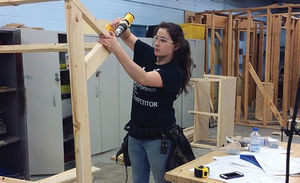Sponsored by:
Designed With A Learner In Mind: How Online Education Is Changing The Game
Continuing studies With a diversity of options and flexibility to work on coursework while still maintaining a career or other personal obligations, online education is a great option for getting ahead.

Mediaplanet Why should someone who is already in an established career consider investing in continuing their education?
MC Once you have attained a certain professional level, there is always room to learn something more. For most successful people, continuing or investing in education is often a natural next step. This is not just the case for individuals; investing in education and training helps organizations stay competitive and retain top talent. Continuous learning is a necessity.
We live in an environment of constant change, with new information and skills quickly replacing the old. Working in highly competitive markets with the need for more diverse and ever-changing skills requires the updating and refining of the learner’s current knowledge, skills and abilities. Participating in continuing education opportunities can refresh or revive your motivation and enthusiasm. Sometimes people learn new ways of doing things that they hadn’t previously considered.
MP For someone who has to meet the demands of work and family life, are online and continuing education programs manageable?
MC Planning is the key. Knowing the program expectations up front and planning accordingly will go a long way to ensuring your success.
Continuing education programs are often designed with the busy learner in mind, so flexibility is built into programs like UNB’s degree completion program, the Bachelor of Integrated Studies (BIS). For learners already busy with work and family life, the program’s core requirements are offered online, so they can work on courses from anywhere, anytime, whatever works for them!
MP What are the benefits of online learning programs?
MC The main benefits of online learning programs are the diversity of options and the flexibility to work on coursework while still maintaining a career or other personal obligations. Currently, UNB has students enrolled in open-entry courses across Canada and as far away as China and Australia. Students range in age from 19 to 64 and often seek out courses that they may want out of personal interest.
A popular one is Personal Financial Planning. We have courses offered across 15 different subject areas and recently launched an assortment of Biology courses in an online format.
Registering in online courses can be an excellent transition into a future full-time or part-time degree program. A key benefit is the learner can take complete ownership of his or her progress.
Students can enroll in a course any day of the calendar year and complete their coursework within a six-month timeframe. Students taking online courses may also be able to accelerate the completion of their current degree programs.
MP What are some of the challenges that online learning programs face?
MC When individuals hear the term ‘online course’ they may wonder if the course is recognized in the same regard as face-to-face courses on-campus. At UNB face-to-face and online courses are equivalent. Online courses undergo a rigorous process to ensure that the academic integrity of the content is upheld to the same standards as traditional face-to-face courses. The delivery format is the only thing that is different. The instructors teaching courses through UNB are either full-time faculty members or contract instructors with real-world experience.
Another misconception is that online courses do not offer the support of regular classes, however, at UNB, online courses offer a high level of interaction between the student and instructor and are designed with a strong support framework.
MP How has new technology shaped the way we learn?
MC With the competitive nature of jobs and the demand of work-life balance, learners are seeking the flexibility of learning on their terms. Online learning options are being sought out now more than ever. The online learning environment provides more tools and resources to assist in learning. There is access to a broader range of experts and more interactive ways to communicate with fellow learners and instructors.
"In the field of continuing education and online learning, you can expect growth of different types of offerings that align with learner needs."
Online support has improved and can enhance the online learning experience. There are more ways to interact, communicate and engage with learners. Students have access to more immediate results in grading and feedback through the use of online tools; there are clever designs and technology that support retention, maintain your interest, and encourage interaction in more complex ways.
In the field of continuing education and online learning, you can expect growth of different types of offerings that align with learner needs. There is an increase in competition, and growth in the market of both non-traditional and traditional students who want flexibility in their educational choices. They seek great engagement in learning through strong design, use of technology, expert teaching, and support.
MP What do you think the future holds for online and continuing education?
MC There continues to be strong demand for flexible continuing education options and more institutions are developing programs to meet that demand. At UNB, we see online learning as an evolution. We try to keep our finger on the pulse of new trends and our programs continue to evolve and improve in terms of quality, rigor, and services.
The market will continue to demand learning opportunities in accessible formats that allow for meaningful engagement. Things like strong course design, use of technology, expert teaching and support frameworks will get the attention of learners and meet their needs. Online and continuing education providers will need to be aware of market trends and be prepared to keep up.





.jpg)
















